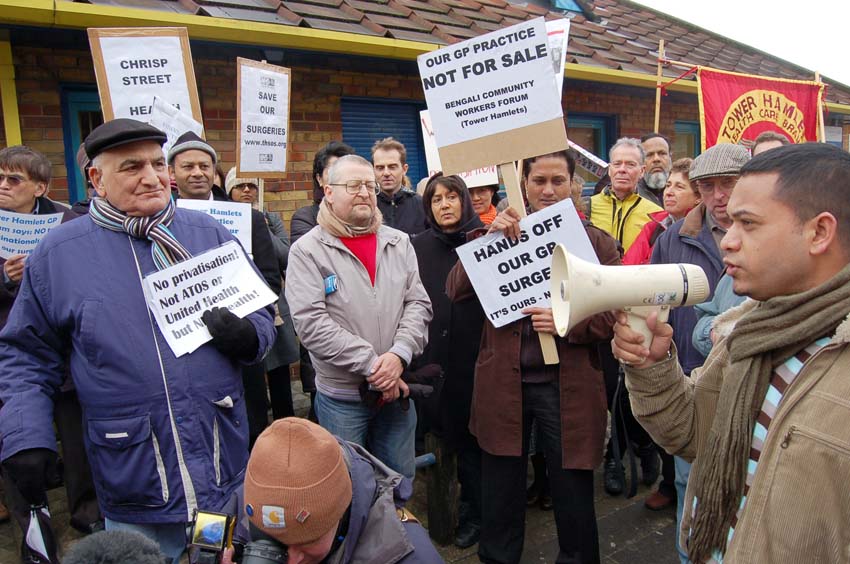TORY health secretary Jeremy Hunt’s speech to delegates at the annual Royal College of General Practitioners (RCGP) conference in Liverpool yesterday morning was angrily received by delegates but welcomed by the leadership of the RCGP.
He was promoting Tory Prime Minister David Cameron’s extremely unpopular proposal to make GPs available 24 hours a day, seven days a week.
Hunt told the conference: ‘The Prime Minister announced a fund to make GPs offer weekend and evening appointments.’
He pledged: ‘. . . Funding to allow GPs to form federations so that people will be able to book evening and weekend appointments, maybe not at their own surgery, maybe at a neighbouring surgery, maybe not face-to-face, maybe by Skype or telephone.’
RCGP chair Dr Maureen Baker said in response to Hunt’s speech: ‘There was much to welcome in detail of these proposals, not least the £400m of investment and support for federated working, but the media debate around the announcement gave the false impression that all patients will be able to walk into their own surgery.
‘Headlines like that serve to raise expectations that GPs cannot live up to with the resources we are currently given.’
Anna Athow, BMA member, told News Line: ‘GPs are absolutely right to oppose federation and networks. These are the slippery slope to large out-of-hospital providers which will be sold off to private companies. The demand for 24/7 working is just what these private companies need to maximise profits and that is why these Tories are trying to push this through. The BMA should speak out against the government’s policies and organise the union to defend every GP surgery. That is why the London region BMA called on the BMA to organise industrial action to keep our GP surgeries open.’
While the leadership of the conference ‘welcomed the details’ of Hunt’s proposals, GPs were furious at the sheer cheek of the Tories demanding 24-hour seven-day-a-week access while cutting funding to the bone, threatening the closure of 98 GP surgeries.
Commenting on the ‘GPonline website’, GP after GP immediately slammed Hunt’s proposals.
Bristol GP partner and educator Dr Nicolas Snelling said: ‘Fundamentally there is not enough money and we are haemorrhaging GPs. Unless the job becomes more attractive then we are not going to attract medical students into general practice.’
Dr Snelling said one of his partners had just resigned in his early fifties because he had ‘had enough’ of the daily pressures of the job. Another local practice had closed after the loss of two partners.
Gateshead GP Dr Neetika Dang said Hunt needed to provide more evidence of his ability to recruit an extra 5,000 GPs. ‘How is he going to do it?’ She said: ‘Where are these recruits coming from, who are they that want to do the job?
‘I was a trainer until last year but stopped because I felt burnt out and now I cannot see myself going back to it because I could not genuinely pass on a passion for the role to my trainee.’
Medical student Sangeeta Patel said: ‘I did not realise that there is such a lack of support for GPs. Only receiving 8% of the NHS budget is crazy – and it’s only going to get worse by the time that we get there.’
An anonymous GP wrote on the Pulse website: ‘Federation is just a Trojan horse to sell us out en masse to greedy private contractors. They can only make a profit by acquiring the good will of a whole city’s patients at bargain basement prices. It’s somewhat sinister that the RCGP seem to be supporting this process.’
Another wrote: ‘How on earth can RCGP back Hunt’s policies?? Who do they represent? Certainly not the majority of grassroots GPs who barely have a personal life currently.’
Earlier that morning, RCGP chair Dr Maureen Baker demanded 8,000 more GPs are recruited by 2020 as 542 GP surgeries are facing closure.
Dr Baker compared general practice to the ‘walls of a dam’ preventing the rest of the NHS being flooded, she warned that the walls of the dam are now at bursting point.
She said: ‘The wall of the dam – the service of general practice – is under huge pressure and unless urgent action is taken to repair and restore the dam, it could burst with terrible consequences for our patients in general practice and indeed for the whole of the NHS.’
